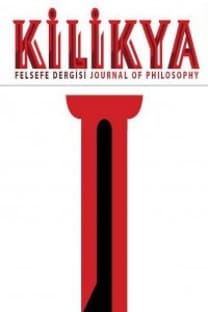Bilgi, Eğitim ve Sorgulamanın Açıklığında Modern Üniversiteleri (Yeniden) Düşünmek
Felsefe hakkı, batı metafizik geleneği, dekonstrüksiyon, sorgulayıcı-düşünme
(Re)Thinking of the Modern Universities In The Openness of Knowledge, Education and Questioning
___
- Derrida, Jacques. (1992). The Other Heading: Reflections on Today’s Europe. Çeviren. Pascale Anne Brault ve Michael B. Naas. Bloomington: Indiana University Press.
- Derrida, Jacques. (1993). Aporias. Çev. Thomas Dutoit. USA: Stanford University Press.
- Derrida, Jacques. (1995). Points… Interviews 1974-1994. Çev. Werner Hamacher ve David E. Welbery. USA: Stanford University Press.
- Derrida, Jacques. (2002). Who’s Afraid of Philosophy?: Right to Philosophy I. Çev. Jan Plug, USA: Stanford University Press.
- Derrida, Jacques. (2004). Eyes of the University: Right to Philosophy II. Çev. Jan Plug, USA: Stanford University Press.
- Derrida, Jacques. (2007). Psyche: Inventions of the Other I. Der. ve çev. Peggy Kamuf ve Elisabeth Rottenberg. USA: Stanford University Press.
- Heidegger, Martin. (1966). Discourse on Thinking. Çev. John M. Anderson ve E.Hans Freund. Giriş: John M. Anderson. NY: Harper & Row Publishers.
- Heidegger, Martin. (1968a). What is Called Thinking? Çev. Fred D. Wieck ve Glenn Gray. NY: Harper & Row Publishers.
- Heidegger, Martin. (1968b). Introduction to Metaphysics. Çev. Ralph Manheim. USA: Yale University Press.
- Heidegger, Martin. (1971a). The Thinker as Poet. Poetry Language Thought içinde. Giriş ve Çev. Albert Hofstadter. NY: Harper & Row Publishers, ss.1-15.
- Heidegger, Martin. (1971b). Building Dwelling Thinking. Poetry Language Thought içinde. Giriş ve Çev. Albert Hofstadter. NY: Harper & Row Publishers, ss. 143-63.
- Heidegger, Martin. (1972). The End of Philosophy and the Task of Thinking.On Time and Being içinde. Çev. John Stambaugh. NY: Harper & Row Publishers, ss. 55–73.
- Heidegger, Martin. (1977). The Question Concerning Technology. The Question Concerning Technology and Other Essays içinde. Giriş ve Çev. William Lovitt. NY: Harper & Row Publishers, ss.3-35.
- Heidegger, Martin. (1990). The Self-Assertion of the German University (1933). Martin Heidegger and National Socialism içinde. Gunther Neske ve Emil Kettering tarafından düzenlenmiş halinden taranmış metin. NY: Paragon House, ss. 5-13.
- Heidegger, Martin. (1995). Fundamental Concepts of Metaphysics: World, Finitude, Solitude. Çev. William McNeill ve NicholasWalker. USA: Indiana University Press.
- Heidegger, Martin. (1998). Letter on Humanism. Pathmarks içinde. Çev. Frank A. Capuzzi, Der. William McNeill, USA: Cambridge University Press, ss. 239-77.
- Heidegger, Martin. (1999). Contributions to Philosophy (From Enowning). Çev. Parvis Emad ve Kenneth Maly. Bloomington: Indiana University Press.
- Heidegger, Martin. (2002a). The Essence of Truth On Plato’s Cave Allegory and Theaetetus. Çev. Ted Sadler, NY: Continuum.
- Heidegger, Martin. (2002b). Being and Time. Çev. John Macquarrie & Edward Robinson. USA: Blackwell Publishing.
- Heidegger, Martin. (2003). The End of Philosophy. Çev. Joan Stambaugh, USA: University of Chicago Press.
- Kearney, Richard. (1986). Dialogue with Contemporary Continental Thinkers. UK: Manchester University Press.
- Kurtar, Senem. (2014). Heidegger ve Poetik Düşünme Düşünmeye Açılan Yeni Yollar. Pharmakon Yayınevi, Ankara.
- Nietzsche, G.W. Friedrich. (2006). Thus Spoke Zarathustra, Çeviren: Adrian Del Caro, Derleyen: Robert Pippin, UK: Cambridge University Press.
- Plato (1997). Plato Complete Works, Çeviren ve derleyen: John M. Cooper, ss.17- 37, Cambridge/ Indianapolis: Hackett Publishing Company.
- Taylor, Charles. (2003). Modern Social Imaginaries, USA: Duke University Press Books.
- Yayın Aralığı: 2
- Başlangıç: 2014
- Yayıncı: Eray Yağanak
Bilgi, Eğitim ve Sorgulamanın Açıklığında Modern Üniversiteleri (Yeniden) Düşünmek
Marksist Kurama Bir Katkı: Lukacs’ın İdeoloji Kavramsallaştırması
Geç Dönem Wittgenstein Felsefesinde Gramer Kavramı ve Dilin Otonomisi
Heidegger Felsefesinde Zamansallığın Göstereni Olarak Sıkıntı Kavramı
What is Conditional Probability? In Defense of Lowe’s Definition(s)
